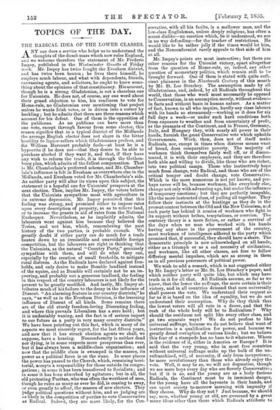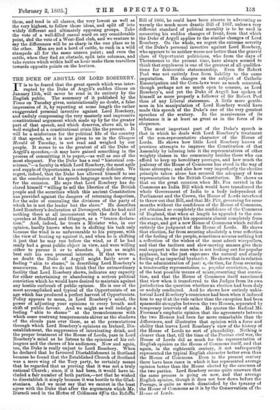TOPICS OF THE DAY.
THE RADICAL IDEA OF THE LOWER CLASSES. ANY one does a service who helps us to understand the thoughts of the dumb mass which now rules England, and we welcome therefore the statement of Mr. Frederic Impey, published in the Westminster Gazette of Friday week. Mr. Impey has twice fought the Evesham district, and has twice been beaten ; he lives there himself, he employs much labour, and what with dependents, friends, canvassing agents, and solicitors, he ought to know some- thing about the opinions of that constituency. His account, though he is a strong Gladstonian, is not a cheerless one for Unionists. He does not, of course, say one word about their grand objection to him, his readiness to vote for Home-rule, no Gladstonian ever mentioning that project unless he wants Irish votes, or is driven into a corner by heckling ; but he admits that there are three reasons which account for his defeat. One of them is the opposition of the publicans. As no publican can have more than one vote, except through favour from some elector, this reason signifies that in a typical district of the Midlands the average English elector does not share in the bitter hostility to liquor-sellers which Gladstonians profess, and Sir William Harcourt probably feels—at least he is a hypocrite if he does not—that they desire to be able to purchase alcohol if they want it, and that, if they have any wish to reform the trade, it is through the Gothen- burg plan, which admits of the fullest compensation. That is Mr. Chamberlain's preferred scheme, and Mr. Chamber- lain's influence is felt in Evesham as everywhere else in the Midlands, and Evesham voted for Mr. Chamberlain's side. As neither party will alter its views upon this subject, the statement is a hopeful one for Unionists' prospects at the next election. Then, implies Mr. Impey, the voters believe that the Unionists sympathise most with agriculture in its extreme depression. Mr. Impey perceived that this feeling was strong, and promised either to impose rates upon every description of property, so as to relieve land, or to increase the grants in aid of rates from the National Exchequer. Nevertheless, as he implicitly admits, the labourers went against him because they believed the Tories, and not him, which, remembering the past history of the two parties, is probable enough. We greatly doubt if either party can do much for a trade beaten down by an irresistible and unavoidable foreign competition, but the labourers are right in thinking that the Unionists, as the natural "Country Party," genuinely sympathise with them, and will do what they can, especially by the creation of small freeholds, to mitigate rural distress. As the Radicals have declared against free- holds, and only desire to make Bumble landlord instead of the squire, and as Bumble will certainly not be an im- proving, and probably not a generous landlord, the feeling in this respect of the country labourers is not likely for the present to be greatly modified. And lastly, Mr. Impey at- tributes much of his failure to the decay in the influence of Dissent. " An alarming feature in our country districts," he says, "as well as in the Evesham Division, is the lessening influence of Dissent of all kinds. Some remains there are of the old sturdy freedom-loving Dissenting feeling, and where this prevails Liberalism has a sure hold ; but it is undeniably waning, and the fact is of serious import to our future as a party in very many country districts." We have been pointing out this fact, which in many of its aspects we most sincerely regret, for the last fifteen years, and now that it has struck election agents we shall, we suppose, have a hearing. Nonconformity is neither dead nor dying, is in some respects more prosperous than ever, but it has always been a middle-class organisation ; and now that the middle class is swamped in the masses, its power as a political force is on the wane. In some places the power has passed to the Church, which, remaining terri- torial, accepts a responsibility for those outside its congre- gations ; in some it has been transferred to Socialists ; and in some it has been absorbed by agitators ; but in all, the old protesting Puritan, who was often the worthiest of men, though he rules as many as ever he did, is ceasing to sway, or even greatly to affect, the masses of new electors. They judge political questions without him, and so judging are as likely in the competition of parties to vote Conservative as Radical. Indeed, they are more likely, for the Con- servative, with all his faults, is a mellower man, and the low-class Englishman, unless deeply religious, has often a secret dislike—an emotion which, be it understood, we are in no way defending—for the teacher of restrictions. He would like to be rather jolly if the times would let him, and the Nonconformist rarely appeals to that side of him. at all.
Mr. Impey's points are most instructive ; but there are other reasons for the Unionist victory, apart altogether from the question of Home-rule, or, indeed, any other question of momentary politics, which remain still to her brought forward. One of them is stated with quite suffi- cient plainness in the Nineteenth Century of this month by Mr. St. Loe Strachey. The assumption made by all Gladstonians, and, indeed, by all Radicals throughout the world, that those who work must necessarily be opposed to Conservatism, is an assumption merely, without evidence in facts and without basis in human nature. As a matter of fact, known to all who inquire, hardly any class labours with its hands so strenuously—working as it does for six full days a week—or under such hard conditions both from exposure to weather and from uncertainty of profit, as the peasants of the Continent, and in France, Germany, Italy, and Hungary they, with nearly all power in their hands, furnish the great Conservative vote which upholds. Governments. Work, then, does not of itself make Radicals, nor, except in times when distress means want of bread, does comparative poverty. The majority of workmen think themselves fairly well off, or if discon- tented, it is with their employers, and they are therefore both able and willing to divide, like those who are richer, into two political camps. Those who instinctively hope much from change, vote Radical, and those who are of the critical temper and doubt change, vote Conservative. Which is the more numerous is not yet known, and per- haps never will be, because workmen, like everybody else, change not only with advancing age, but under the influence of temporary emotions ; but they are perfectly incapable, like the more instructed class, of pulling all together. They follow their instincts at the hustings as they do in the present contest between the Old and the New Unionism, and each party has behind it armies of workmen who fight in its support without bribes, temptations, or coercion. The contrary theory is a mere fiction, or rather a survival of the days when no man who worked with his hands having any share in the government of the country, most workmen of intelligence adhered to the party which promised that, if successful, they should have a share. The democratic principle is now acknowledged on all hands, either as a triumph or as a sad necessity of civilisation, and workmen, like all other classes, are free to follow differing mental impulses, which are as strong in them as in all previous possessors of political power.
We wish to add a remark, which is not suggested either by Mr. Impey's letter or Mr. St. Loe Strachey's paper, and which neither party will quite like, but which may have truth in it for all that. All Radicals assume, so far as we know, that the lower the suffrage, the more certain is their victory, and in all countries demand that men universally shall possess the vote. We understand their request so far as it is based on the idea of equality, but we do not understand their assumption. Why do they think that the lowest voters will all vote in a drove, and that the rush of the whole body will be to Radicalism ? Why should the residuum not split like every other class, and go two separate ways ? We do not profess to like universal suffrage, because we do not believe that want of instruction is a qualification for power, and because we greatly dread corruption of various kinds ; but we believe this fear of a stampede has no base to it whatever. Where is the evidence of it, either in America or Europe ? It is said that the very young, who in most free countries without universal suffrage make up the bulk of the un- enfranchised, will, of necessity, if only from inexperience, be more revolutionary than those who already enjoy the vote. Well, it may be so, we will not dogmatise, though we see mere boys every day who are fiercely Conservative ; but if it is so, and the young are as a body furious Radicals, the Continent must be in imminent danger, for the young have all the bayonets in their hands, and can upset society to-morrow morning with impunity if they choose. Why do they not Just because, we should say, men, whether young or old, are governed by a great many ideas other than those which Radicals attribute to them, and tend in all classes, the very lowest as well as the very highest, to follow those ideas, and split off into widely different and ultimately opposing groups. Take the vote of a well-filled casual ward on any considerable point, and the vote of a West-End club, and we venture to say the differences will be as sharp in the one place as in the other. Men are not a, herd of cattle, to rush in a wild stampede all for the same unseen point; and even the cattle, when they find an obstacle, split into columns, and take routes which within half an hour make them travellers towards opposite points on the horizon_



































 Previous page
Previous page